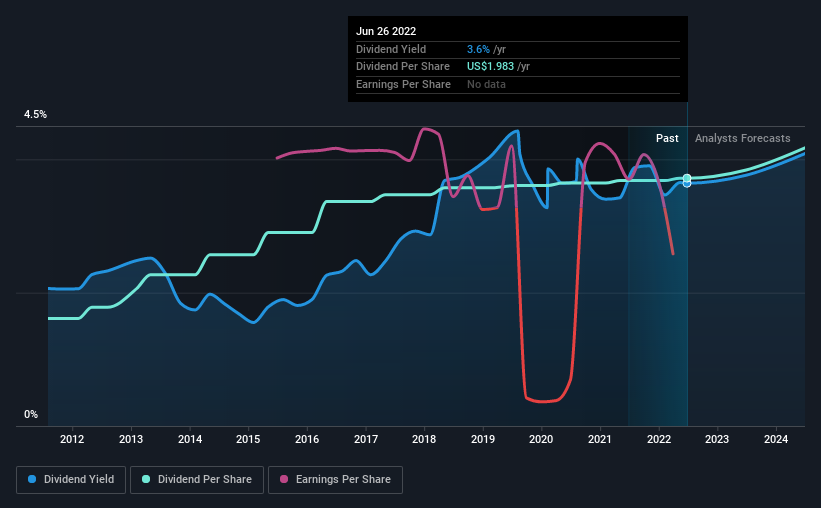It Might Not Be A Great Idea To Buy Cardinal Health, Inc. (NYSE:CAH) For Its Next Dividend
Some investors rely on dividends for growing their wealth, and if you're one of those dividend sleuths, you might be intrigued to know that Cardinal Health, Inc. (NYSE:CAH) is about to go ex-dividend in just two days. The ex-dividend date is one business day before the record date, which is the cut-off date for shareholders to be present on the company's books to be eligible for a dividend payment. The ex-dividend date is of consequence because whenever a stock is bought or sold, the trade takes at least two business day to settle. In other words, investors can purchase Cardinal Health's shares before the 30th of June in order to be eligible for the dividend, which will be paid on the 15th of July.
The company's upcoming dividend is US$0.50 a share, following on from the last 12 months, when the company distributed a total of US$1.98 per share to shareholders. Looking at the last 12 months of distributions, Cardinal Health has a trailing yield of approximately 3.6% on its current stock price of $54.45. Dividends are an important source of income to many shareholders, but the health of the business is crucial to maintaining those dividends. As a result, readers should always check whether Cardinal Health has been able to grow its dividends, or if the dividend might be cut.
Check out our latest analysis for Cardinal Health
If a company pays out more in dividends than it earned, then the dividend might become unsustainable - hardly an ideal situation. Cardinal Health paid a dividend last year despite being unprofitable. This might be a one-off event, but it's not a sustainable state of affairs in the long run. Considering the lack of profitability, we also need to check if the company generated enough cash flow to cover the dividend payment. If Cardinal Health didn't generate enough cash to pay the dividend, then it must have either paid from cash in the bank or by borrowing money, neither of which is sustainable in the long term. Over the past year it paid out 127% of its free cash flow as dividends, which is uncomfortably high. It's hard to consistently pay out more cash than you generate without either borrowing or using company cash, so we'd wonder how the company justifies this payout level.
Click here to see the company's payout ratio, plus analyst estimates of its future dividends.
Have Earnings And Dividends Been Growing?
Businesses with shrinking earnings are tricky from a dividend perspective. If earnings fall far enough, the company could be forced to cut its dividend. Cardinal Health reported a loss last year, and the general trend suggests its earnings have also been declining in recent years, making us wonder if the dividend is at risk.
The main way most investors will assess a company's dividend prospects is by checking the historical rate of dividend growth. Cardinal Health has delivered an average of 8.7% per year annual increase in its dividend, based on the past 10 years of dividend payments.
Remember, you can always get a snapshot of Cardinal Health's financial health, by checking our visualisation of its financial health, here.
Final Takeaway
Is Cardinal Health worth buying for its dividend? We're a bit uncomfortable with it paying a dividend while being loss-making, especially given that the dividend was not well covered by free cash flow. Overall it doesn't look like the most suitable dividend stock for a long-term buy and hold investor.
So if you're still interested in Cardinal Health despite it's poor dividend qualities, you should be well informed on some of the risks facing this stock. For example, we've found 3 warning signs for Cardinal Health (2 can't be ignored!) that deserve your attention before investing in the shares.
Generally, we wouldn't recommend just buying the first dividend stock you see. Here's a curated list of interesting stocks that are strong dividend payers.
Have feedback on this article? Concerned about the content? Get in touch with us directly. Alternatively, email editorial-team (at) simplywallst.com.
This article by Simply Wall St is general in nature. We provide commentary based on historical data and analyst forecasts only using an unbiased methodology and our articles are not intended to be financial advice. It does not constitute a recommendation to buy or sell any stock, and does not take account of your objectives, or your financial situation. We aim to bring you long-term focused analysis driven by fundamental data. Note that our analysis may not factor in the latest price-sensitive company announcements or qualitative material. Simply Wall St has no position in any stocks mentioned.

 Yahoo Sport
Yahoo Sport 






































